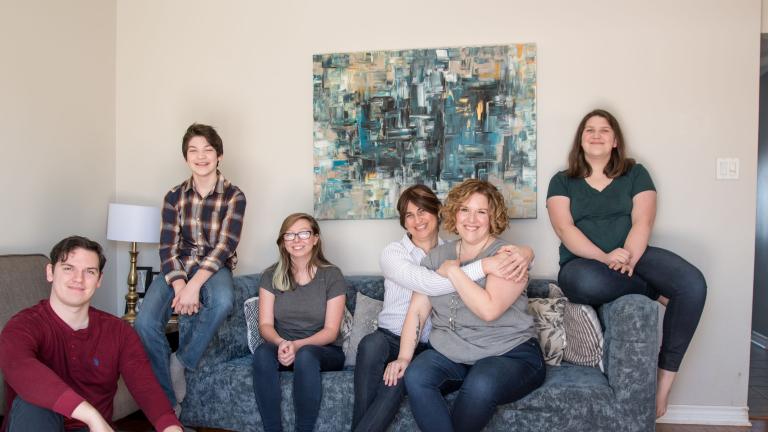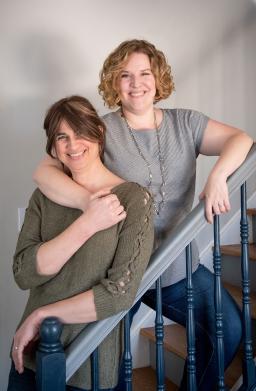"I am a girl trapped in a boy’s body,” our then 11‐year‐old explained in a heartfelt letter to me and my spouse. Our middle child had typed the message just moments ago from the bedroom across the hall. “More than anything, I need to be a girl. Please help me."
We rushed in to tell her we loved her, no matter what. We loved her, first and foremost, and would figure everything out later.
As a parent, this revelation knocked me off my feet. Fear and confusion overcame me. I had a lot of learning and, just as importantly, unlearning to do. I researched everything I could about the right way to support trans youth, visiting reputable websites, looking over studies and speaking to many members of the transgender community.
It came down to this: as her parents, we needed to affirm who she is, let her lead, and protect her as best we could from discrimination.
I quickly realized what little I had known about trans people was mostly wrong and steeped in my own feelings and misconceptions. I had grown up with outdated and ignorant ideas about this highly marginalized group. Unfortunately, so had most of the people we knew. How was this going to impact her relationships at school and within our community?
I’ve realized there are two kinds of people: those who wish to learn, and those who refuse to.
The people we knew split into those two camps. While most were quick to support my daughter and brush up on their knowledge, some were convinced she was a confused and even abused child who was being led astray by a dangerous ideology.
Kids in the school yard teased her and called her names on social media. People who were once my friends stopped talking to me, preferring to share ugly memes about the “dangers” of trans people in bathrooms, and painting my child and everyone in her community as deranged perverts. A school employee asked if Alexis could wait until the following year to begin transitioning, when she started at a new school, rather than run the risk of angry parents calling the office that year.
We felt these attacks on her and our parenting deeply. But as a parent, I had no time to lick my wounds. I had to fight for her. I needed to know her rights like the back of my hand so I could be the ally she needed in her corner.
Thankfully, the province of Ontario’s Human Rights Code, which specifies protections for trans and gender‐diverse people, made her transition smoother. With gender identity protections built in, we could use it to change her identification, demand the school create a safe environment for her and insist that medical professionals provide the support she would need.
Knowing her rights made it much easier to stand tall in the face of discrimination in our personal lives. We were determined Alexis would grow up and live a great life, and I dared anyone to try and get in her way. Alexis was growing up in a time when a child could come out as trans and, in many cases, find acceptance.
My spouse was not lucky enough to grow up in an accepting time.
Zoë is a transgender woman. For the first 18 years of marriage, I knew her as my husband, oblivious to the secret she was keeping out of fear it would tear our lives apart. Unable to continue living an inauthentic life, she came out to me and our children 18 months after Alexis did, and began taking steps to live as the woman she’s always known she is. Seeing the love our family and most of the community had for Alexis is what Zoë needed to finally be herself.
With everyone now living their truth, our family is stronger than ever. I couldn’t be prouder.
Not long after Zoë came out, the Government of Canada added “gender identity or expression” to the Canadian Human Rights Act and the Criminal Code. Gender identity is how we identify, while gender expression is how we outwardly express that identity. Both were now protected nationwide, alongside race, religion, age, disability, sexual orientation and other traits people have been historically persecuted for.
We know what these rights mean on paper. But what do they mean in everyday life for families like mine?
Simply put, they provide legal protection from discrimination.
My transgender family members can live as the gender they really are and insist they be treated with the same respect afforded to others. My wife and I can live together and love one another without fear of being imprisoned or worse. We can raise our children without worry of them being removed from our care. This gives us the ability to enjoy a quiet, simple family life. We can work and our children can go to school. While many people might take these basic freedoms for granted, not a day goes by when I’m not grateful we live in a country with human rights legislation that makes this possible for us.
These rights are what hold us together in a way that would quite likely be impossible without them. Laws protecting 2SLGBTQI+ people set the tone for bigger societal conversations. They provide the framework for being able to live openly, which gives room for others to see us doing so and learn there is nothing to fear or ridicule; we’re just like everyone else. In Canada, we are able to live together as a happy, healthy, thriving family.
This does not mean we are free from discrimination – far from it. My family has faced open harassment and threats of violence. We have been called names and had slurs spat at us. Laws provide the framework for acceptance, but beliefs and attitudes need to be updated too. Acceptance is coming, but we still have a way to go. Progress, as I’ve learned, is not always a straight line. Today, we see growing vocal intolerance, protests at pride parades, and anti‐2SLGBTQI+ sentiment being used in some political platforms.
Thankfully, that hasn’t stopped us from living. In 2017, my wife and I held a vow renewal ceremony to honour 20 years of marriage. In a friend’s garden, surrounded by our children and loved ones, we said “I do” all over again, knowing our love is stronger than ever, and that the world is slowly beginning to embrace it.
We’ll keep living proudly and openly as the Canadian 2SLGBTQI+ family we are, hoping to teach those who see us that there is nothing to hate in being true to oneself and true in love.
Author
Rowan Jetté Knox is an award‐winning human rights advocate and the author of two memoirs: "Love Lives Here: A Story of Thriving in a Transgender Family" and "One Sunny Afternoon: A Memoir of Trauma and Healing".





